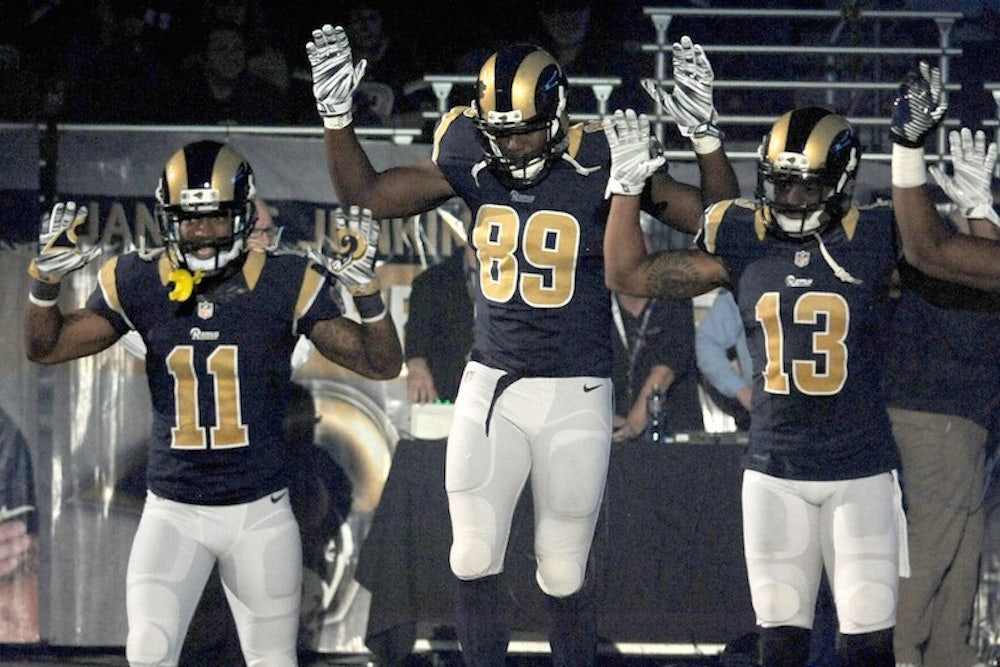On Sunday, several St. Louis Rams football players took the field with their arms raised in the iconic gesture of protest against Michael Brown’s killing. The display soon prompted an indignant response from the St. Louis Police Officers Association, which released a statement condemning the behavior and calling on the Rams and the NFL to punish the players and issue an apology. “[N]ow that the evidence is in and Officer Wilson's account has been verified by physical and ballistic evidence as well as eye-witness testimony,” wrote a spokesman for the association, “it is unthinkable that hometown athletes would so publicly perpetuate a narrative that has been disproven over-and-over again." The spokesman complained that the players had “take[n] to the turf to call a now-exonerated officer a murderer.”
The episode was, in other words, a perfect illustration of the problem with St. Louis County Prosecutor Bob McCulloch’s abuse of the grand jury process in deciding not to indict Wilson.
As I’ve pointed out before, McCulloch would have been perfectly justified in declining to indict Wilson on his own. The Missouri law governing police violence is written in such a way as to make a conviction enormously difficult under the best of circumstances, and the evidence in this case was murky.
But McCulloch didn’t simply pass on indicting Wilson. He chose to have his decision validated by the grand jury. These are two very different processes, with vastly different implications. Had McCulloch simply thrown up his hands, sans grand jury, and said he didn’t have a case, the blowback would have been intense. But most of it--at least among those not already committed to one view or another*--would have focused on the law that creates such a high bar for prosecutions.1 And that would have been a good thing. Any law that consistently makes policemen feel justified in killing unarmed people, rather than forcing police to make every effort to neutralize people through non-lethal means, is a deeply suspect law.
A simple non-indictment decision from McCulloch would also have left Wilson’s status ambiguous—at least in terms of public perception, if not legally. It would have allowed Wilson to avoid a trial, but few neutral observers would have felt comfortable claiming that he’d been vindicated, much less found blameless. In the public mind, there would have been a giant asterisk hanging over his case, a kind of moral limbo that seems justified for the killer of an unarmed teenager absent a full-blown legal proceeding.
Instead, McCulloch used the grand jury to affirmatively establish Wilson’s innocence. The problem, again as I’ve previously pointed out, is that grand juries simply aren’t equipped to adjudicate guilt or innocence. They’re almost entirely beholden to the prosecutors who stage-manage them. And they aren’t adversarial—there’s no one to push back against the prosecutor’s arguments. McCulloch essentially got to make the case for Wilson’s innocence—highlighting evidence that corroborated Wilson’s account and poking holes in conflicting accounts—without another lawyer scrutinizing McCulloch’s claims and pressing the opposite case.
And now we’re beginning to see the consequences of this procedural injustice. Thanks to McCulloch’s quasi-trial, Wilson’s defenders feel comfortable arguing that his version of events has been “verified” and that the narrative against him has been “disproven.” But nothing of the sort has happened. Only a full-blown trial with a judge and opposing counsel could establish these things. Only an adversarial back and forth can begin to settle the question of a killer’s guilt or innocence. Worse, we’re no longer talking about the misguided law that makes it so difficult to prosecute abusive police officers. The conversation has shifted to the cosmic unfairness of hounding Wilson, who after all has been found innocent by … well, by nobody. You see my point.
McCulloch’s liberal defenders argue that the process he led was flawed but that it got to the right outcome. In fact, it’s impossible to separate the two. The enormous flaws in the process mean the outcome is deeply suspect, too. We’re only beginning to appreciate just how much.
Here's how I imagine it would have played out: People on the left would have assumed the fix was in, and that McCulloch was too friendly to cops, and probably racist to boot. People on the right would have assumed that Wilson's actions were justified, full stop. People in the middle would have thought, "Woah, a cop kills an unarmed kid, and we don't even have a trial. That seems kind of crazy." At which point lawyers would have rightly pointed out that the law is insanely friendly to cops in these situations, bringing the law itself under suspicion.
*This clause was added shortly after publication.
